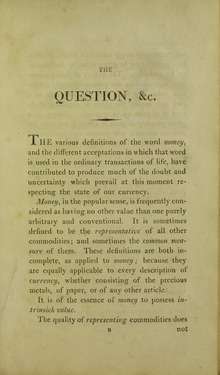Currency appreciation and depreciation
Currency depreciation is the loss of value of a country's currency with respect to one or more foreign reference currencies, typically in a floating exchange rate system in which no official currency value is maintained. Currency appreciation in the same context is an increase in the value of the currency. Short-term changes in the value of a currency are reflected in changes in the exchange rate.[1][2][3][4]
| Foreign exchange |
|---|
| Exchange rates |
|
| Markets |
| Assets |
| Historical agreements |
|
| See also |

Causes
In a floating exchange rate system, a currency's value goes up (or down) if the demand for it goes up more (or less) than the supply does. In the short run this can happen unpredictably for a variety of reasons, including the balance of trade, speculation, or other factors in the international capital market. For example, a surge in purchases of foreign goods by home country residents will cause a surge in demand for foreign currency with which to pay for those goods, causing a depreciation of the home currency.
Another cause of appreciation (or depreciation) of a currency is speculative movements of funds in the belief that a currency is under- (or over-)valued and in anticipation of a “correction”. Such movements may in themselves cause the value of a currency to change.
A longer-run trend of appreciation (or depreciation) is likely to be caused by home country inflation being lower (or higher) on average than inflation in other countries, according to the principle of long-run purchasing power parity.[3]
Economic effects
When a country's currency appreciates in relation to foreign currencies, foreign goods become cheaper in the domestic market and there is overall downward pressure on domestic prices. In contrast, the prices of domestic goods paid by foreigners go up, which tends to decrease foreign demand for domestic products.
A depreciation of the home currency has the opposite effects. Thus, depreciation of a currency tends to increase a country’s balance of trade (exports minus imports) by improving the competitiveness of domestic goods in foreign markets while making foreign goods less competitive in the domestic market by becoming more expensive.
In the international capital market, a change in a currency’s value may give rise to a foreign exchange gain or loss. The appreciation of the domestic currency raises the value of financial instruments denominated in that currency, while there is an adverse impact on debt instruments.[3]
Market
To predict currency appreciation and depreciation, traders use the economic calendar. The calendar includes economic releases that determine the strengths and weaknesses of the economy. Thus, if a trader only knows that the GDP growth of the country whose currency he trades declined compared with the forecast, he can expect the fall of the domestic currency.[5]
Also, the terms are used when talking about the central bank monetary policy. The central bank is a single authority that issues money. Thus, its policy has an impact on the domestic currency: if the central bank raises the interest rate, or gives optimistic comments on the country’s economy, the domestic currency appreciates. If the bank cuts the interest rate or signals problems for the economy, the domestic currency depreciates.[6]
See also
- Devaluation
- Revaluation
- Capital appreciation (accounting and finance)
- Exchange rate
- Marshall–Lerner condition
References
- "The Impact of falling exchange rate | Economics Help". www.economicshelp.org. Retrieved July 11, 2016.
- Krugman, Paul. "International Economics - Theory and Policy - Chapter 13 - Exchange Ratesand the ForeignExchange Market: An Asset Approach" (PDF). eml.berkeley.edu.
- "Currency Appreciation and Depreciation | Encyclopedia.com". www.encyclopedia.com. Retrieved May 30, 2020.
- "currency appreciation". TheFreeDictionary.com. Retrieved May 30, 2020.
- Lioudis, Nick. "Economic Factors That Affect the Forex Market". Investopedia. Retrieved May 30, 2020.
- Maeda, Martha; Burrell, Jamaine (2011). The Complete Guide to Currency Trading & Investing: How to Earn High Rates of Return Safely and Take Control of Your Financial Investments. Atlantic Publishing Company. pp. (The influence of central banks). ISBN 978-1-60138-442-3.